East London story that changed the course of the war
The Royal Docks and London’s East End suffered mass devastation during the Second World War.
From Black Saturday on September 7 1940, the lives of locals changed forever.
But the latest in our Forgotten Stories series takes us almost four years on from the start of the bombings that killed so many and destroyed so much.
And it is a story that has stayed relatively unknown for generations. It is a story that changed the course of the war.
It is a privilege to relay it through the memories of Stan Harris, now 88, but who worked as a young man in his family funeral directors business, and who has laid generations of East End families to rest as the boss of T Cribb and Sons. It was his dream job which he started the day after leaving Napier School in East Ham.
Stan, still referred to as Stan Cribb or Mr Cribb, because of his incredible ability to command respect, admiration and love from those he has helped, was employed as a coffin maker at the age of 16 back in March 1944, though he did so much more.
Stan as a young man
“Our shop and stables in Canning Town, were among the few things left standing after four years of bombings, leaving so much waste ground,” said Stan at his Essex Home. “Then one morning it seemed as though we were being invaded. Masses of Army trucks full of soldiers suddenly began arriving. The noise was incredible.” Stan and his uncle Tom Cribb, the head of the business, went to investigate.
Tents, guns, provisions, barbed wire and the like were being unloaded and Uncle Tom found out from a commanding officer the area was being turned into an army encampment. It took seven days to set up over an area covering Canning Town, Custom House, Silvertown and North Woolwich.
The practice sessions
The servicemen were not only British, but Czech, Polish and Norwegians. The camp was surrounded by fences and it was decided the funeral business would be inside the perimeter.
Stan recalled: “Uncle Tom said we must have been the only undertakers in the country to have our own armed guards. When I locked up at night the Military police man would say: ‘Goodnight young Cribb, see you tomorrow.’ “
In the funeral business, there are moments of humour. At the celebration of a loved one’s life – these can bring joy to mourners. But in these dark days of Britain’s history, you could not imagine one piece of humour that would have done credit to the scriptwriters’ of Dad’s Army.
At Cribbs’ base in Lansdowne Road machine gun fire rang out, blasting the stable and buildings. Groom Jack Stubbs hid as best he could, fearing for his life. After an hour or so of silence, eventually Uncle Tom walked in.
Stan recalled: “Jack told us he was scared to death. Machine gun fire hit the stable near where he was grooming horse Baby. Amazingly they both survived. Uncle Tom went outside and found a soldier laying flat out with his face blackened up and hiding behind rubble.”
The cleaned up version of what the legendary Uncle Tom told him goes something like this. “Did you just shoot a —–ing round into my stables? You nearly killed the horse and groom.”
The soldier stood and apologised, claiming everyone on ‘Commando training’ thought the entire bombed out area was unoccupied. “Bloody hell, sorry guv,” he said. Uncle Tom later got assurances from apologetic commanding officers there would be no repeat and issued strict instructions to his men.
“We had six horses for horse-drawn funerals then. We brought them – and the tradition back 32 years ago and incredibly now have 26,” said Stan.
Stan at a funeral with Prince Charles
Bit back to the dramas of1944, the next two months were odd. Many of the servicemen, especially the Poles, drank in local pubs, and went to local shops. They became part of the community.
“We asked them many times what they were doing, but never got a straight answer that made any sense. ‘Training camp’ was all that came back. Were we about to be invaded?, “ said Stan. “Then in May something wasn’t right. The atmosphere was strained and strange. You could sense it. The normal friendly soldiers were stand offish.
“A few days later I had an early start and I rode my bike to our base and everything seemed so quiet. I looked through some of the fences and couldn’t see anyone. I got to the shop and stables. There was no sentry on guard and our gates were open. Canning Town and Silvertown had been devastated by bombs and razed to the ground, but this was like no other silence. When gran, uncle and the staff turned up we stood there motionless.
“That evening the family sat down for our evening meal and tried to work out what was happening. We were all worried there was going to be another massive raid from Hitler and that would be the end .We had a restless night.” All was made clear the following morning on the family wireless. The family listened in amazement.
“This is the BBC Home Service. D Day has come. Early this morning the Allies began an assault on the north-western face of Hitler’s European fortress.”
Stan said: “We could not believe it, we had invaded Europe. This was the big one. If we failed now, England would be ruled by Hitler.”
June 6, 1944, D-Day, saw one of the most audacious and heroic wartime operations of the 20th century. More than 130,000 Allied soldiers landed on the beaches of France as part of Operation Overlord. It was the largest and most difficult land and sea operation ever mounted in warfare.
As Stan said: “The largest amphibious invasion of all time, and, in fact, it did win us the war.”
Stan at a funeral with Uncle Tom
Even years later, it was not widely known that the area now known as Newham played such an important part during the preparations for the D-Day landings. Leading up to the invasions, more than two million tonnes of stores left the Royal Docks. These included 190,000 tanks and vehicles. Many of the concrete artificial harbours, known as Mulberries, used in the landings were also constructed at the Royal Docks. Many of the invasion troops left from the Royal Docks too.
They had been waiting in those makeshift camps at rehearsing among the bomb-damaged ruins in the areas.
Stan joined the 15 -19th King’s Royal Fusiliers two years later for his National Service. After his service, he helped mould T.Cribb & Sons into the business it is today. It is widely respected not only in East London, but nationwide and in other countries like Ghana, where they have a funeral home, for the way it helps lay to rest those who have lost their lives and help the bereaved families.
But one question still remains in Stan’s mind to this day about those events of 1944.
“We wondered for many months after what had become of those soldiers who befriended us East Enders in there time in our manor. We later discovered 12,000 brave men who fought in those landings had been killed or wounded. Their sacrifice must never be forgotten,” added Stan.
Wouldn’t it be a special moment if anyone reading this Forgotten Story was among the thousands in that training camp, was still alive to tell the tale and could meet up with Stan?
Stan at a funeral locally
This is an extended version of the piece I have written for the Forgotten Stories series.
The Forgotten Stories series is on the website www.londonsroyaldocks.com
They are both written articles and filmed interviews in which those who are developing our area are seeking to keep or history and history alive.
Here’s the link to the marvellous site:
http://www.londonsroyaldocks.com/forgotten-stories/
There is also a Facebook Group, the Newham For Museum group, which you may find interesting.
https://www.facebook.com/MuseumforNewhamGroup/?fref=ts
Pictures Colin Grainger/T Cribb & Sons/ Newham Archives


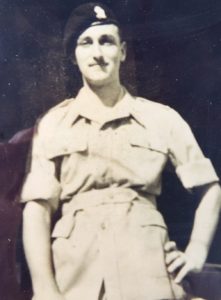
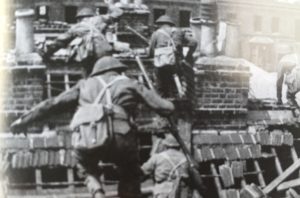
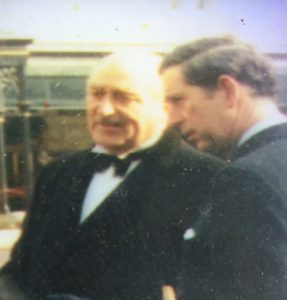
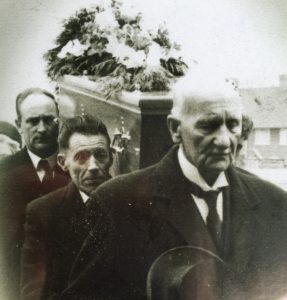
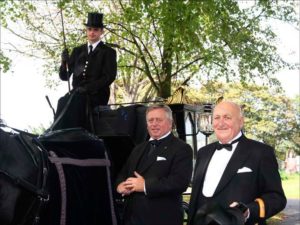
[…] East London story that changed the course of the war […]